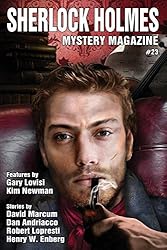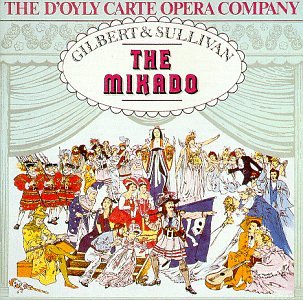It seems like just two weeks ago I was writing about having a new story published. And it was. After an 18-month gap I have two fresh kills in November. Go figure.
"The Cop Who Liked Gilbert and Sullivan" is my first appearance in Sherlock Holmes Mystery Magazine. It is an old-fashioned fair-play mystery in which the aforementioned cop, who is happily engaged in running the evidence room, is dragged out of his cozy shelter to solve a murder which may or may not depend on a clue only a Savoyard would understand.
Did I hear someone ask What's a Savoyard? Perhaps I need to explain a bit.
Gilbert and Sullivan were nineteenth century Englishmen who created comic operas. G wrote the words, S composed the music. The third member of the duet, so to speak, was Richard D'Oyly Carte who produced their works. Think of him as Brian Epstein to the Beatles, trying to keep them from breaking up, or killing each other.
D'Oyly Carte created the Savoy Theatre, where most of the works premiered, and thus, a fan of their work is called a Savoyard, because Gilbert-and-Sullivan-head takes too long to say.
Here is an example of the sort of out-of-the-box thinking D'Oyly Carte contributed to the operation. You may remember that Oscar Wilde made a famous lecture tour of the United States. (Customs Official: Do you have anything to declare? Wilde: Only my genius.) The tour was arranged by D'Oyly Carte because the G&S opera Patience was a satire on the Aesthetic Movement and would have fallen flat if Americans didn't know about Wilde.
The operas featured memorable, beautiful music, hilarious, ingenious lyrics, and, let's be honest, abysmal plots. As my hero notes in the story you can't go too far into the stories of any of the operas without finding a plot hole you could drive a hansom cab through.
A random example: In The Gondoliers a woman admits to trading her own baby for one of a pair of other boys. But twenty years later, coming across those now grown men, she expresses no interest in knowing which of them was her flesh and blood. Huh?
The fact is that Gilbert couldn't plot his way out of a paper bag But his stuff was hilarious and being tied to Sullivan's tunes makes it immortal.
Fortunately, considering Gilbert's dreadful plotting, he never tried a mystery, but crime does feature in a few of the operas.
The main character of The Mikado, for instance is Koko, the Lord High Executioner, who promises that he's ready to do his job:
As some day it may happen that a victim must be found,
I've got a little list -- I've got a little list
Of society offenders who might well be underground,
And who never would be missed -- who never would be missed!
There's the pestilential nuisances who write for autographs --
All people who have flabby hands and irritating laughs --
All children who are up in dates and floor you with 'em flat --
All persons who in shaking hands, shake hands with you like that --
And all third persons who on spoiling tete-a-tetes insist--
They'd none of 'em be missed -- they'd none of 'em be missed!
The Mikado himself rolls off a gleeful list of appropriate punishments he has ready for evildoers.
All prosy dull society sinners,
Who chatter and bleat and bore,
Are sent to hear sermons
From mystical Germans
Who preach from ten to four.
The amateur tenor, whose vocal villainies
All desire to shirk,
Shall, during off-hours,
Exhibit his powers
To Madame Tussaud’s waxwork.

Among the lesser known (but still good) works is Ruddigore, in which a character named Robin is cursed. He must commit a crime every day or die in agony. Unfortunately, he is not very good at it.
Robin (melodramatically) How would it be, do you think, were I to lure him here with cunning wile -- bind him with good stout rope to yonder post -- and then, by making hideous faces at him, curdle the heart-blood in his arteries, and freeze the very marrow in his bones? How say you, Adam, is not the scheme well planned?
Adam. It would be simply rude -- nothing more.



